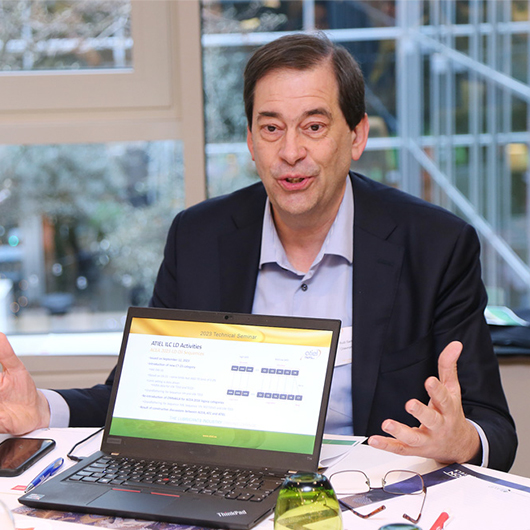Texaco people profile: Rudi Sanders


Rudi Sanders
Specialist, Regional Technical Service
Length of time in business: 32 years
Based in: Ghent, Belgium
Interesting fact: I have been Vice-President of a local football (soccer) club for over 10 years
What credentials / experience do you have?
I began my career with Texaco in 1991, and since then have had many different roles within the lubricants field. These include laboratory manager of the Chemical & Physical Test Laboratory, developer of PCMO’s (passenger car motor oils) for the aftermarket and OEM segments, country manager and manager of sales & marketing for Benelux and France, OE Manager for Europe and Eurasia and developer of marine engine oils. My current role is Product & Technology Support Specialist for Europe.
I am currently chairman of the Industry Liaison Committee for ATIEL (Technical Association of the European Lubricants Industry) and co-chair of the ATIEL liaison committee for light duty vehicles. I also remain very active in discussions with ATC (The Technical Committee of Petroleum Additive Manufacturers in Europe) and ACEA (The European Automobile Manufacturers' Association), regarding the development of current and future ACEA oil sequences for both light and heavy-duty vehicles.
What do you believe Texaco has to offer customers?
I believe Texaco is able to provide technical expertise to customers and business partners based on the insights and experience we have gained over many years of cooperation with OEMs and industry organisations. Even more importantly, at Texaco, we ensure that people are respected.
What do you think is the biggest challenge facing the industry at the moment?
There are quite a number of legislative changes upcoming in Europe. One example is the introduction of new and stricter emission standards for light and heavy commercial vehicles in the new Euro 7 regulations. Euro 7 does not only define lower emission limits for hydrocarbons, nitrogen oxides (NOx), carbon dioxide (which is directly linked to fuel consumption) and particulates, but also determines limits for other pollutant emissions which may affect human health, global warming and ozone depletion. These include nitrogen dioxide, nitrous oxide, ammonia, methane, isocyanic acids, polycyclic aromatic hydrocarbons and aldehydes. The new regulations also include more effective emissions tests, better market surveillance tests, a broader range of driving conditions for on-road tests, compliance with emissions rules for longer periods of time and the digital monitoring of compliance.
Additionally, further legislation is expected for the use of alternative fuels such as biodiesel, CNG, LNG, methanol, e-fuels and hydrogen, and in particular legislation to promote power-train electrification, which several car, van, truck and bus manufacturers are already working on.
What do you most want to achieve in the next 12 months?
I’d like to continue to help the industry to develop ACEA oil sequences that ensure that customers use the appropriate engine oils in their vehicles.
(As every vehicle manufacturer recommends individual and specific oil formulas for optimum protection, ACEA sets engine oil standards which manufacturers must follow, classifying by oil type or class and category. The ACEA oil sequences are updated every few years to ensure they are up to date with changes to regulations and technologies within the engine and lubrication industry.)
What behaviour or personality trait do you most attribute your success to, and why?
I have been lucky to have had inspirational figures that have helped and supported me throughout my life. My father always encouraged me to excel in whatever I put my mind to, be it sports, social contacts, science … and to keep trying even when I encountered pushback. My PhD. mentor at university taught me the importance of integrity when publishing or documenting scientific reports. They encouraged me to be open to unexpected outcomes and not to design experiments that only confirmed my own “narrowed” views (tunnel vision syndrome). They also advocated that you should always seek to share knowledge for the benefit of all.
Lastly, my first three supervisors at Texaco gave me the intellectual and professional room to develop my skills and knowledge. They taught me to accept that mistakes can be made, but that they are there to learn from – better to make a mistake when doing something, than make no mistakes by doing nothing.
What did you want to be when you grew up?
I always hoped to become a scientist at the very edge of technology. Before joining Texaco, I underwent a series of exams and tests to become a scientist or astronaut at the European Space Agency. Unfortunately, I was not successful in joining the space program, but I have still fulfilled my dream of being at the cutting edge of science.






























